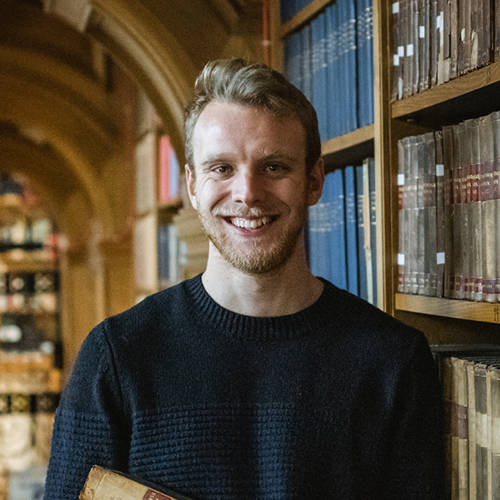Overview
The first years of life are critical to a person’s development. Join us and explore this diverse and rapid stage of development with BA Early Childhood Studies degree at Canterbury Christ Church University.
If you’re passionate about advocating for children and families in your community, then our BA in Early Childhood Studies will teach you how to support and change children’s lives using research-based and holistic insights into child development.
Take a holistic approach in understanding early childhood development. From ages 0-8, we cover a wide range of child development stages, which includes physical, emotional, cognitive, social, and pedagogical.
Alongside this, you’ll learn about external factors that contribute to a child’s development, such as cultural, psychological, sociological, historical, and political. You’ll also gain an in-depth, critical understanding of development and education during the early years, both through a national and international perspective.
On our Early Childhood Studies degree, not only will you explore developmental theory and a sociological model for children, but you’ll do so through multi-modal practices, enhancing both your specialist knowledge and transferable skills.
Studying Early Childhood Studies at CCCU will open many doors upon graduation. With this knowledge and skillset, you will be ready to enter multiple sectors. From policing and education to social work and corporate settings, you’ll gain a variety of transferable skills alongside your specialism, preparing you for your future career.
We know employers are looking for dynamic, open-minded graduates who can adapt, innovate, and collaborate. This is why we have designed a new way of teaching and learning to ensure that you are work-ready for when you graduate. Our 2026 course will reflect this new approach. The 2026 course page will be made live shortly.
Why study Early Childhood Studies at CCCU?
National Student Survey 2024
Be supported throughout
Join our thriving CCCU community where you'll always be supported.
Entry requirements
Accepted qualifications
We accept a wide range of general qualifications that attract UCAS Tariff points either on their own or in combination with others. Below are some common examples.
| Qualification | Grades |
|---|---|
| A Levels | BBC |
| BTEC | DMM |
| Access | 15 Distinctions and 30 Merits |
| International Baccalaureate | 29 Points |
The grades in this table provide an indication of what is required to study this course. If you have qualifications that are not present in the table or want to tell us more about you specific situation then please contact our friendly Course Enquiry Team.
DBS clearance
A Disclosure and Barring Service (DBS) check is not an entry requirement. However if you take part in work-related experience, visits, or placements to settings where you are undertaking regulated activity, the setting may determine that a DBS check is required.
You will be required to undergo a DBS check and arrange this through the University before undertaking the activity.
Don’t meet these entry requirements?
If you do not meet these entry requirements, a foundation year is a great way of beginning your university journey. We recommend you speak to our Course Enquiries team who will advise on a route to study that fits you.
More information
Contact us
Module information
As well as the core modules, you may also have the opportunity to study a number of option modules in your second and third year. Option modules will not be pre-selected for you. We provide examples of option modules. The availability of specific option modules may vary from year to year. The offer of an option will be subject to a minimum number of students choosing the module to ensure the appropriate student experience. The offer of option modules may also be affected by staff availability. It means we cannot guarantee the availability of a particular optional module. However, we will ensure you have a choice of option modules.
Core/optional modules
How you’ll learn
The course adopts a blended approach to teaching and learning. This means that the course is delivered through a mix of on-campus face-to-face and digital activities. We tailor our blended learning approach to the needs of our students and the requirements of your programme.
We emphasise student-centred learning, which encourages you to raise questions, engage in discussion and debate and develop reflective and critical learning strategies.
All courses are informed by the University’s Learning and Teaching Strategy 2015-2022.
When not attending lectures, seminars, workshops or other timetabled sessions you will continue learning through self-study. Typically, this involves reading journal articles and books, undertaking research in the library, working on projects, and preparing for coursework assignments/examinations, workshops and seminars.
Your module tutor will direct you towards specific readings and/or activities to complete before and after class.
The course is taught by a team of enthusiastic senior lecturers from a wide variety of professional backgrounds related to the children and families workforce. This extensive professional experience provides a rich and diverse learning experience and supports a practical and theoretical insight into the career choices open to you.
Our engaging tutor team will enable you to develop your identity as an early childhood specialist. You will be encouraged to explore your own interests and reflect on children and childhoods. You will be expected to work with others on your course, as well as independently and you will be supported in doing this by your seminar tutors as well as your own personal academic tutor.Lucy Fogg and Amy McKaughanCourse Directors
How you’ll be assessed
We recognise that all students perform differently depending on how they are being assessed, which is why we use a combination of assessment methods. These may include presentations, essays, artefacts, rationales, posters, portfolios, online tasks, an individual study and an unseen examination within an optional module. These methods offer you an opportunity to develop skills for the workforce as well as succeeding within your studies.
Your future career
The degree prepares you for employment in the early years sector, equips you with a range of transferable skills and is designed to enhance employability and future work opportunities in a range of areas. Our graduates enjoy successful careers across education, health, social care, research, policy and charity-based settings locally, and globally. You will also be well equipped to pursue postgraduate study or undertake further professional training.
This course is wonderful as it opens up so many doors for you.SarahEarly Childhood Studies student
Fees
The 2025/26 annual tuition fees for this course are:
| UK | Overseas | |
|---|---|---|
| Full-time | £9,535 | £15,500 |
Tuition fees for all courses are payable on an annual basis, except where stated. The fees represented here are for study with Canterbury Christ Church University. If you are looking to study at a partner institution, please visit their website for fees information.
Please read the 2025/26 Tuition Fee Statement for further information regarding tuition fees and year on year fee increases.
Home (UK) Fees
The Government has announced that it will increase the tuition fee cap by 3.1%, in line with inflation, for the 2025/26 academic cycle. Subject to parliamentary approval, the University intends to increase our tuition fees in line with this and as per our terms and conditions. This means that from September 2025 our undergraduate home tuition fees are expected to be £9,535.
Overseas/International Fees
Undergraduate / PGCE tuition fees for international students are not set by the UK Government.
- Read advice about funding your degree
- See information about the financial support available for undergraduate studies
- If you would like information about paying your fees, please contact accounts.receivable@canterbury.ac.uk
- For specific fee queries, please contact fees@canterbury.ac.uk
Industry links
We welcome guest lecturers from the British Youth Council, National Childbirth Trust, Gillingham Street Angels, We are Pyxis, Canterbury Foodbank, and Catching Lives. You’ll also have opportunities to undertake projects with Kent Refugee Action Network.
Regulated by the Office for Students
The Office for Students (OfS) regulates Canterbury Christ Church University. The OfS is the independent regulator of higher education in England. It aims to ensure that every student, whatever their background, has a fulfilling experience of higher education that enriches their lives and careers. Further details about its work are available on the OfS website.
Apply now
Duration:
3 yearsUCAS code:
X310Location(s):
CanterburyFind out more
Sign up to hear the latest from the University, including upcoming events, useful updates, student life and more!




